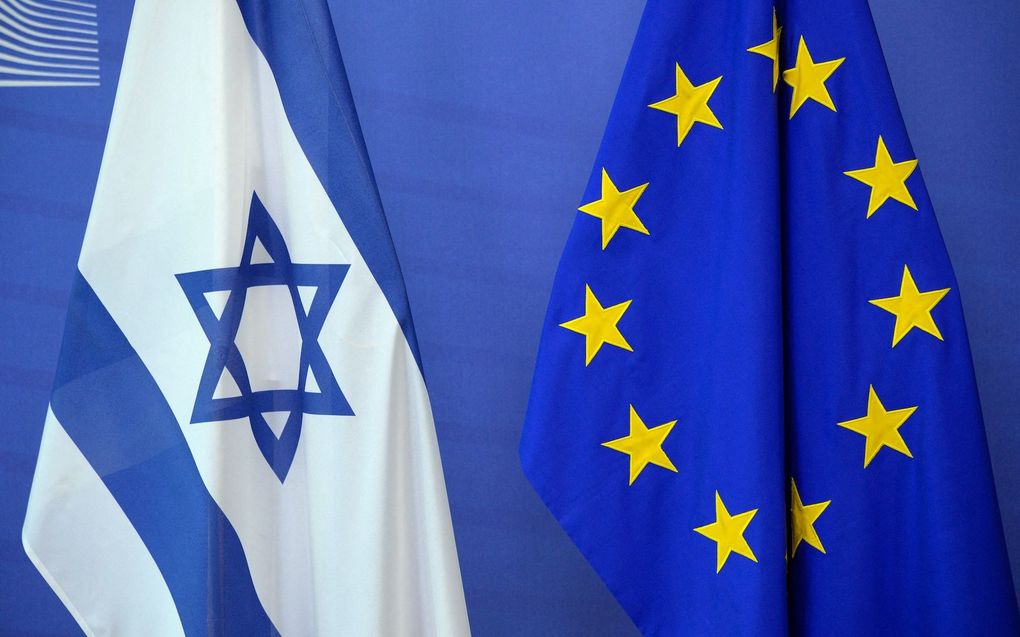Evert’s analysis: Why does the war in Israel have so much impact in Europe?

The Israeli and the European flag along each other. Photo AFP, Thierry Charlier
Opinion
Visiting school groups from Europe are evacuated from Israel. Almost all churches in Europe have prayed for the conflict on Sunday. And all talks about this are filled with emotion. Three questions about the Holy Land in Europe.
Does Israel belong to Europe?
No, and yes. Technically, Israel is in Asia. But for the rest, Israel is very much European. All newsrooms are keen to follow this conflict; that feels very self-evident.
If you enter the country as a foreigner, the people speak to you in a European language: English. The whole set-up of state and society is not Asian but Western. Israel shares the ideals of freedom and liberty with Europe and North America.
If you travel as a European in the region through Turkey, Syria or Egypt, you might feel like a foreigner. But when you come to Israel and smell the culture there, you feel more “at home”.
This is not accidental. Western societies share the Judeo-Christian heritage. This goes back to the days of the Old Testament. Although not everybody practices that Biblical faith anymore, the Judeo-Christian heritage shapes our values today.
Another factor is that many Jewish families in Israel are rooted in Europe. Many European cities (from Amsterdam to Prague and Chisinau to Odessa) were once famous because of their flourishing Jewish life. After the Holocaust, much of that has disappeared. But the European way of thinking is still in the DNA.
If Israel and Europe share the Judeo-Christian culture, does that mean both parties are always of the same mind?
No, it doesn’t go that fast! The rabbinic way comes first: The shared heritage brings debate and, first of all, fierce discussion about shared values.
Most enthusiasm comes from Evangelical churches. For instance, the World Evangelical Alliance showed itself “deeply distressed” by the aggression and terrorist attack, according to a declaration on Monday.
Those churches feel a natural connection with Israel as God’s people. This nation fills them with hope since they read in Romans 11 that “all Israel will be saved” and will be a blessing for the rest of the world.
Of course, there are many differences between those groups. Some see Israel as the Jewish nation living all over the world. The state of Israel has no special meaning for them. Others see the state of Israel as God’s special planting in 1948, not comparable with any other state in the world.
Those churches are to be found in both the United States and Europe. Many of them are Pentecostal in their identity. Dispensationalism is usually the keyword there. Other churches are Reformed in the tradition of the Puritans, who had a high expectation of the Biblical prophecies.
Many visitors who were (and partly still are) locked in Israel when the conflict broke out last Saturday came from such a background. This led to immediate response in their churches back home.
Why is the European Union usually critical towards Israel?
Politically speaking, the dialogue between Israel and Europe is somewhat rigid. This has to do with the Holocaust and the centuries of anti-Semitism before that. In short, Israel does not want to be ‘lectured’ by Europe.

Another factor is that Israel is a young nation-state. The country is created only for Jews (although some Arabs have citizenship there as well), which still attracts newcomers. The European Union uses an opposing concept: integrating all nation-states so that they can no longer be distinguished from each other. Patriotic pride is seen as something of the past and not of the future. In Israel, this is seen much differently.
A specific topic of contention is the subsidy for Palestinian school books. Some say these are full of hatred against Jews. On Monday, the European Commission first announced the suspension of all the Palestinian subsidies; later, this was reversed by the member states’ foreign ministers.
There is also a growing concern about anti-Semitism in European countries. Partly, this has to do with social media, but partly also with immigrants from Muslim countries.
Having said that, it is also true that most European countries defend the safety of Israel. Germany sees that even as a central priority in its foreign policy.
Related Articles










